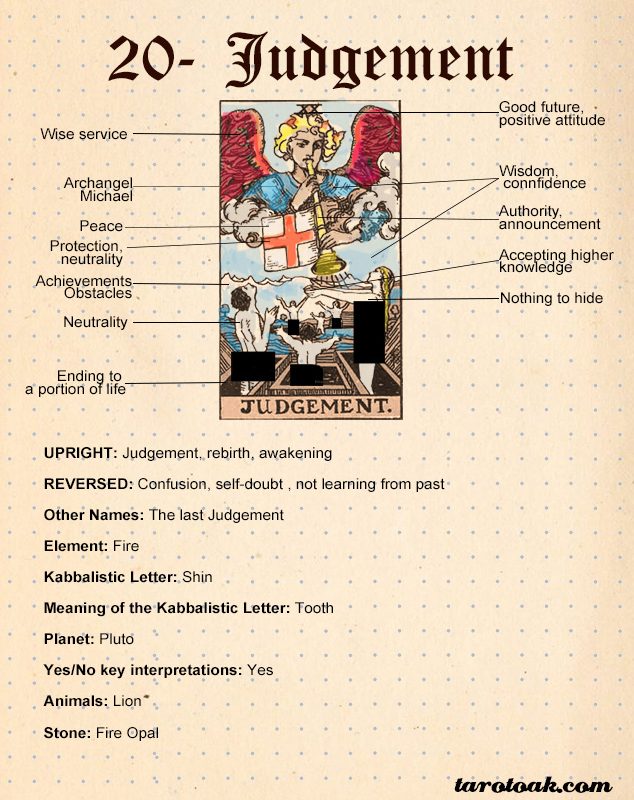The Judgment tarot card occupies a pivotal role in the pantheon of tarot imagery and symbolism. It is not merely a representation of finality or reckoning but a harbinger of profound transformation and renewal. Encompassing a range of meanings, the Judgment card evokes the notion of rebirth, serving as a clarion call to awaken one’s higher self and embrace a newfound understanding of life’s purpose.
At first glance, the imagery of the Judgment card is striking. It typically depicts an angel blowing a horn, awakening the slumbering spirits from their graves. This powerful visual serves as an intriguing metaphor for awakening from ignorance and the inertia that life can impose. The call to rise signifies the imperative of self-reflection and accountability in one’s actions, highlighting that life’s journey is not a solitary experience, but one interwoven with the fabric of community.
The essence of the Judgment card lies in its ability to prompt introspection. When this card appears in a reading, it invites the querent to examine their past choices and seek lessons from experiences gone by. It is a gentle nudge to sift through the debris of former decisions, revealing the jewels of wisdom embedded within. Past mistakes, regrets, and triumphs all converge to inform present circumstances, urging individuals to learn and grow.
In the tarot, Judgment embodies the cyclical nature of existence. Life consists of various phases—birth, growth, death, and rebirth. This card beckons the querent to acknowledge that endings are not purely negative; rather, they pave the way for new beginnings. Each experience renders the individual more astute and resilient, fostering an essential evolution of spirit. It shatters the illusion of permanence and encourages a celebration of the transient beauty of life.
Beyond personal evolution, the Judgment card resonates with the collective human experience. The card’s call for awakening extends beyond individual boundaries, encompassing families, communities, and even societies as a whole. It begs the question: What collective burdens do we carry? What historical patterns persist? The card implores society to address its collective conscience, to rise up against complacency, and to engage in a synchronized march toward enlightenment.
A compelling aspect of the Judgment card is its association with the concept of karma. The actions taken in the past not only shape personal futures but also reverberate through the lives of others. As one reflects upon their decisions, they must confront the ripples created, understanding that each choice carries weight. The Judgment card is an affirmation that justice prevails, often in unexpected manifestations. It reminds individuals that accountability is not merely an expectation from others but a responsibility to oneself.
The element of resurrection in the card also introduces the theme of forgiveness—both of oneself and others. As individuals confront their past, they acknowledge failures and missteps. Understanding and accepting these experiences becomes a vital part of the healing process. The Judgment card suggests that with self-forgiveness comes liberation, enabling one to move forward with a lighter heart. Conversely, to forgive others fosters healing within relationships, allowing space for renewal and harmony.
When examining the implications of the Judgment card in various contexts, it reveals distinctive layers of meaning. In personal development, the card calls for a reassessment of life goals and aspirations. Are the ambitions that once drove you still meaningful? Is it time to pivot in a new direction? Judgment serves as a mirror, reflecting latent desires and urging the exploration of uncharted territories. Much like the phoenix rising from its ashes, there exists profound power in transformation.
Similarly, when the Judgment card emerges within a career-related reading, it suggests a crossroads. The querent may face the need to reevaluate their professional trajectory. It prompts consideration of whether the current path aligns with a greater purpose or if it is merely a means to an end. This transition invites an ethical evaluation of one’s contributions to the workforce—how do actions impact not only oneself but colleagues and clients? It is a potent reminder that careers are not solely about success, but about the legacy one leaves behind.
Romantically, the Judgment card magnifies the importance of authenticity in relationships. It spurs individuals to peel back layers of self-deception and reveal their truest selves. It calls for honesty in intimacy and challenges partners to confront unresolved issues. Rather than remaining mired in past grievances, it encourages open communication and vulnerability, vital components for any enduring partnership.
Moreover, spiritually, the Judgment card resonates with the call for awakening to a higher and more profound understanding of existence. It often signifies a calling toward spiritual pursuits, enlightenment, and a quest for truth. It might beckon the querent to explore philosophical questions that challenge conventional narratives, considering what lies beyond the veil of ordinary perception. This awakening may catalyze a period of profound spiritual inquiry, culminating in revelations that forever alter the way one perceives the world.
In summation, the Judgment tarot card stands as a complex emblem of rebirth, introspection, and accountability. Through its multifaceted perspectives, it transcends the simplistic notion of ‘judgment’ as mere reckoning. It becomes an invitation, urging individuals to awaken to their truths, embrace their past, and unlock their potential for a transformative future. The symphony of lessons encapsulated within the Judgment card resonates within the heart, challenging all to rise, evolve, and emerge anew—a call echoed in every corner of existence.







Leave a Comment